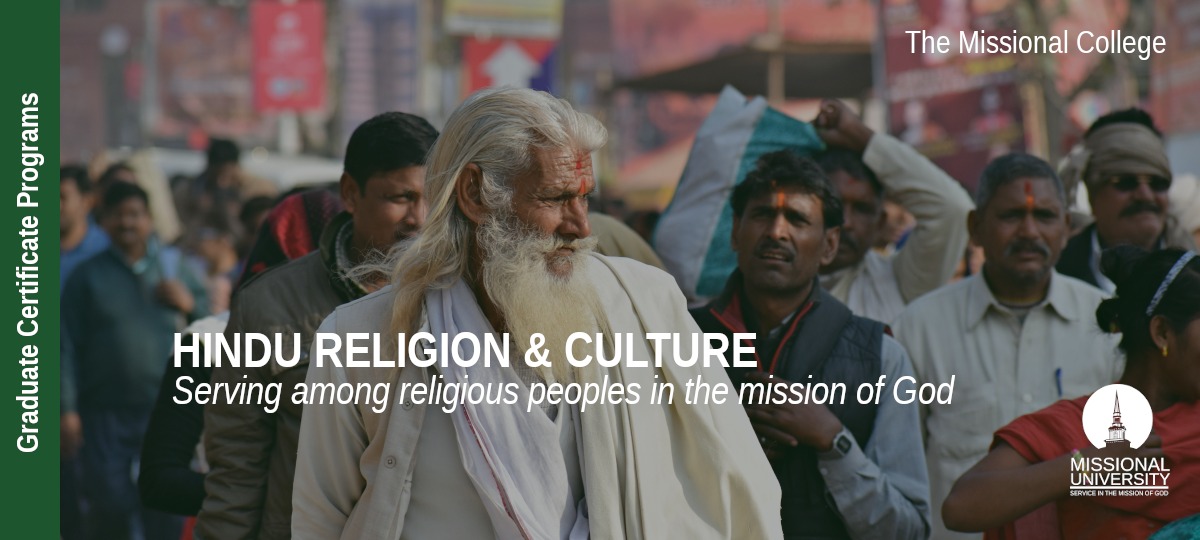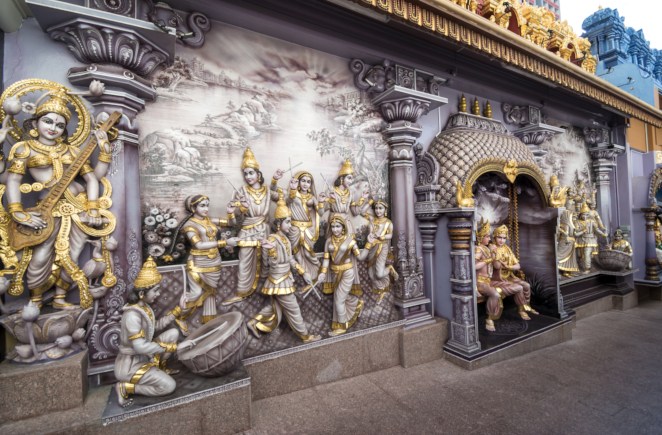
Online Graduate Certificate Program in
Hindu Religion & Culture
☀ Totally Unique Program = only available at Missional University
Expand Your Intercultural Abilities Today!
REQUEST INFORMATION
Ready to learn more about the
Graduate Certificate in
Hindu Religion & Culture?
LEARN MORE NOW
The Graduate Certificate in Hindu Religion & Culture offers students an understanding of Hindu religion and culture as it is practiced in predominant Hindu societies as well as it's influence on western culture. The program challenges Christians to think theologically and missionally and learn practical ways to serve among Hindu people in their community, country and across the globe. The certificate enables students to gain the following capabilities:
-
- ability to compare and contrast various approaches to answering key questions regarding the relation between Christianity and world religions
- ability to evaluate Christian/Hindu interaction historically, in the modern period, and its impact on missions and contemporary Hindu political movements
- ability to read ancient Hindu religious texts in translation, understand modern Hindu philosophical movements and create Christian responses to Hindu religious thought
- basic competency in articulating the Hindu salvific systems of India and their diversity of views as to the nature of God and ways in which these salvific systems shape the task of explaining the gospel
- basic competency in reflecting theologically upon the central themes of Hindu religion and culture including classical Hindu views of self, the body, the cosmos, and human action
- basic competency in researching Hindu philosophy and developing a Christian approach to Indian thought while addressing philosphical and ethical issues within Hinduism
- ability to examine core sociocultural expressions of Hinduism such as rituals, contemplative renunciation, and devotion or the gobal and national distribution and diffusion of cultural norms associated with Hinduism, or ways in which Hinduism engages visual art through the use of symbols, artifacts, color and images
- ability to develop methods and strategies to share the Christian faith with Hindu friends or to start churches in the Hindu context
Hinduism is the world's third largest religion. It is an Indian religion and dharma, or way of life, widely practised in the Indian subcontinent and parts of Southeast Asia. Hinduism has been called the oldest religion in the world, and some practitioners and scholars refer to it as Sanātana Dharma, "the eternal tradition", or the "eternal way", beyond human history. Scholars regard Hinduism as a fusion or synthesis of various Indian cultures and traditions, with diverse roots and no founder. Its followers, known as Hindus, constitute about 1.15 billion, or 15–16% of the global population. Hinduism is the most widely professed faith in India, Nepal and Mauritius. It is also the predominant religion in Bali, Indonesia. Significant numbers of Hindu communities are also found in the Caribbean, Southeast Asia, North America, Europe, Oceania, Africa, and other countries. The Graduate Certificate in Hindu Religion and Culture provides students with an opportunity to understand Hindu philosophy, ethics, rituals, cultural norms, and practices; and to develop hands-on tools for Christian engagement with Hindu adherents.
Program Features
-
Integrated practicums allow you to gain valuable real-world experience
-
Learn from academic practitioners from around the world
-
Credits earned in this certificate program can apply to a Missional University Master's degree program
Course Effort
Course Length
Credits Required
Program Cost
What Will I Study?
We offer the most comprehensive approach to serving among religious peoples in the mission of God.
An exploration of the relationship between God who saves and humanity among the world’s diverse religious phenomena. The historical scope of this course begins with popular questions such as, “Do all paths lead to the same God?”, “Can salvation be obtained apart from the Christian Church?”, “What happens to people who never heard the Gospel of Jesus Christ?” and “Where is God in non-Christian religions?” and compares and evaluates the models commonly proposed to answer these questions.
Survey of the ancient religious texts of India and modern religious and philosophical movements with particular emphasis on Hindu religious thought. Considers the Christian response to these faiths as they have become highly influential in the western context. Focuses on issues of contextualization, witnessing, apologetics and church planting in the Indian context.
Deep study of the salvific systems of India and the diversity of views as to the nature of God. Students will engage strategically in the task of explaining the Gospel to this different viewpoint.
An investigation into core themes central to the study of Hindu religion and culture in terms of classical Hindu theories of self, the body, cosmos and human action. Students read from Hindu texts ranging from ancient cosmology to philosphical teachings and modern ritual practices. Students evaluate core ideas about the human mind and body, showing how they fit into concepts of the self, and practices of embodiment in Hinduism; and how they relate directly to both western and classical Hindu theories. Students develop an interpretive framework for understanding classical Hindu approaches to ethics, liberation, and views of the body and the mind as well as the many forms of modern practice such as divinisation rituals, worship of deities, and theological reflection.
An advanced research course exploring key issues for research in regards to Indian philosophy and the Christian faith’s approach to Indian thought. Students will research and write a publishable quality paper relating to significant philosophic and ethical issues within Hinduism.
Analysis of theories, philosophy, methods and strategies for engaging friends from religious traditions and cultures of South Asia known as Hinduism. Includes an investigation of the most common views of salvation and the nature of God in Indian culture.
Optional Additional Courses
Analysis of the historical development, core principles, and contemporary practices of Hinduism in the sociocultural and economic context of South Asia. The course also examines philosophical and theological thoughts of Hinduism in relation to Christian theology.
Geographic exploration and comparative analysis of the national, regional, and local distribution, diffusion, and cultural (material and non-material) norms associated with the Hindu religion. Students will engage through assigned readings, online discussions, and collaborative work that will help develop a better understanding for missional outreach around the world.
This course analyses the biblical and theological principles of gospel’s interaction with a culture and the methods of church planting using the specific context of Hindu culture as the primary frame of reference. Over one billion Hindu people around the world today present a challenge to the Christian missions which will be explored through emphasis on examining the process of conversion, baptism, ecclesiology, and contextualization in the Hindu context.
When Can I Get Started?
We offer multiple start dates each year to give you flexibility in your education, life and work schedules.
JANUARY
MARCH
MAY
AUGUST
OCTOBER
A Career in Navigating Cultural Difference
Is this Your Mission?
Missionary, Church Planter, Community Ministry Practitioner, Immigration Services Coordinator, Community Worker, International Worker, Humanitarian Worker, Missional Team Leader, Global Director, Faith and Development Manager, Marketplace Ministry Worker, Children's and Youth Worker, Researcher
Request Information Now
How Much Will it Cost?
We offer tuition based upon country of residence. According to the Human Development Index, all countries around the world fall into one of four categories:
-
(Tier 1) - Very High Human Development
-
(Tier 2) High Human Development
-
(Tier 3) Medium Human Development
-
(Tier 4) Low Human Development
Our tiered global tuition makes higher education affordable for everyone world wide.

TIER COUNTRIES
100% Tuition
$395
per credit hour
3 credit course
$1185

TIER COUNTRIES
80% Tuition
$316
per credit hour
3 credit course
$948

TIER COUNTRIES
60% Tuition
$237
per credit hour
3 credit course
$711

TIER COUNTRIES
40% Tuition
$158
per credit hour
3 credit course
$474
Tiered tuition based on country of origin and scholarships available. Find your country of residence here for more information.
Tuition may be further reduced by participating in the Sponsorship Program.
